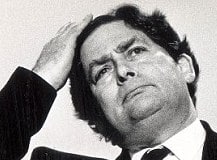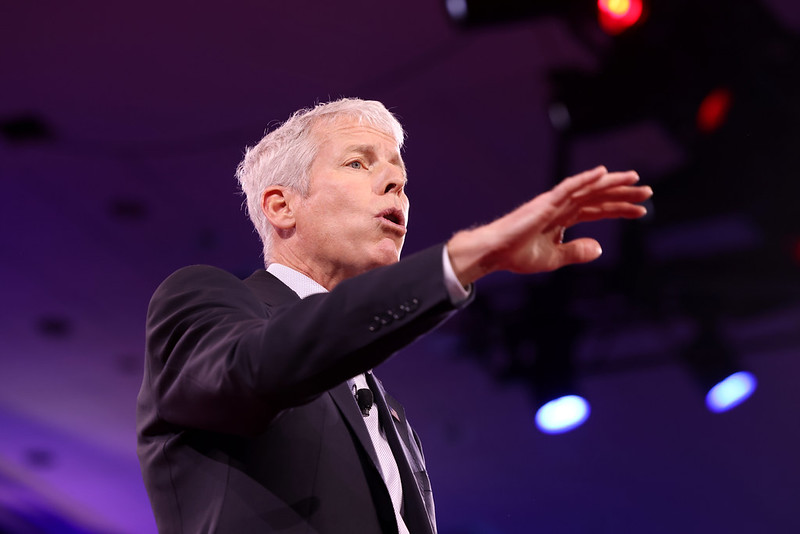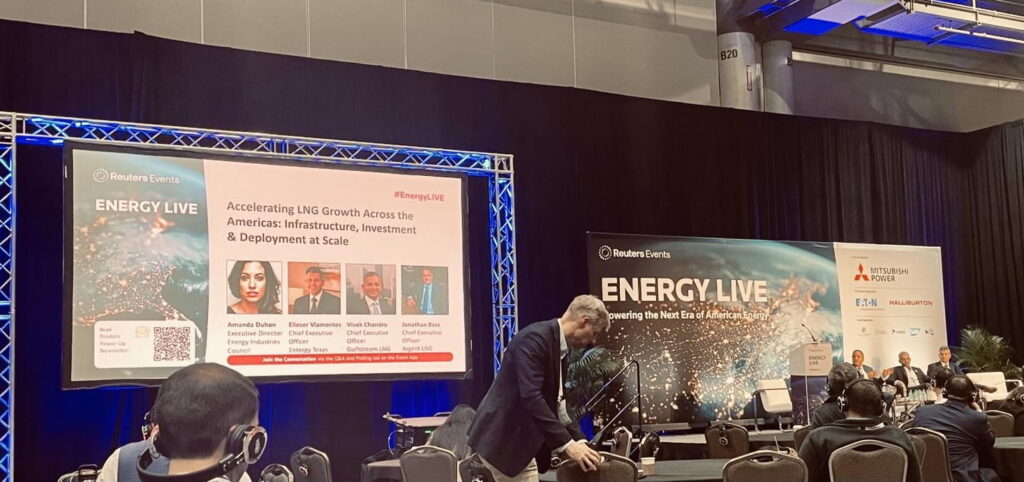Lord Lawson is a patriot. He believes himself to be a very wise man indeed. But his sale of BP to the private sector nearly handed the oil company to an Arab state and this means that today, governments cannot control carbon emissions.
The Hayek-inspired revolution was about to be completed as British Petroleum (BP) would be sold into private ownership.
BP had long been a sponsor of the Institute of Economic Affairs (IEA) which was crucial in raising Thatcher and Lawson to the crowning heights of the British state.
They would return the favour by now selling off the company, loosening it from the control of bureaucrats.
Ironically, the way Lawson conducted the sale would prove so controversial that BP itself would object and accuse the government of failing to get the best deal for the taxpayer.
Sir Peter Walters, the chairman of the oil major, now believes that if Lawson was in fact trying to act in the interests of the British public, then he showed extraordinary poor judgement, putting the ideological need for a successful sale ahead of ensuring the best price, and ultimately acting out of “panic”.
When the Conservatives came into power in 1979, the British state still owned 51 per cent of the company.
Geoffrey Howe, on becoming chancellor, began the sale of over 80 million shares, or a five per cent stake. It was Lawson who began planning the complete sell off. “It was the largest share sale the world had ever seen,” he would recall.
Largest Flotation
The chancellor opted for a fire sale; the shares would be sold over three years, but a single price would be set at just £3.30.
The price was suggested by Michael Richardson, the head of of corporate finance at the merchant bankers who advised the government on the sale.
Lawson recalls: “I astonished both Michael Richardson and my officials by crying ‘Done!’ as soon as the price, for which Richardson apologised, was put to me. It was the shortest pricing meeting in which I ever participated.”
Walters met with Lawson’s treasury official at BP‘s head office in St James’s Street. “What sort of period are you going to make this sale,” he asked.
“This is by far the largest flotation in human history. I assume we’re going to do it over a number of years.”
The official replied: “Oh, we’re going to do it over three years,” before adding adding “But we’re going to price it immediately for the whole of the three years and we will just collect a third, a third, a third of the money.”
Walters was stunned. “So you’re actually selling it one lump?” The official nodded. “I think that’s risking failure. Anything can go wrong. It’s the biggest share offering ever made in this market.”
“You might find that the market had gone up to a point where you get a pound a share more for the second tranche.”
Walters advised a staged sale, with a new price set each year. But the official was not negotiating. “Oh no, we’ve got so many other privatisations,” he said. Walters concluded: “That is tremendously risky.”
The BP boss was so concerned about the method of sale that he insisted on speaking to Lawson directly. He outlined his fears that the share price might collapse, allowing a rival foreign controlled firm to take over Britain’s biggest energy company.
Lawson recalls the warning: “There will be the possibility that an unwelcome buyer could obtain a major stake in BP for a very low initial cost,” Lawson quoted Walters as saying.
Brushed aside
“Twenty per cent of the company may be procured from desperate sellers for around £1 billion.” Lawson was, however, adamant that the sale should be rapid.
The government was set on a course of massive privatisation, and the budget had been drawn up on the basis of billions in profits from the sale of the oil company.
The chancellor would not countenance any arguments to stagger the sale, even if this would mean greater profits for the government, to the benefit of the taxpayer. Walters had delivered his warning, but “Lawson rather brushed it aside.”
On Thursday 15 October 1987, the government announced the share price of BP to the general public, amid much fanfare and costly advertising.
Lawson spoke in front of a vast crowd in front of the Old Botanic House in the City of London. Paratroopers abseiled down the front of the headquarters of BP unrolling a huge banner.
“The price was all rolled up like a enormous curtain, so paratroopers came down over the side of the building on ropes and rolled it and rolled it and rolled it and there it was: 3-3-0. The government’s share offering of 330 pence was open for three weeks, or 21 days”, recalls Walters.
That evening the weatherman Michael Fish told BBC viewers that “earlier on today, apparently, a woman rang the BBC and said she’d heard there was a hurricane on the way.”
He smiled: “Well, if you’re watching, don’t worry, there isn’t.”
Overnight, a freak hurricane crossed the Atlantic and tore through country, destroying England’s oldest and most beautiful trees.
When City traders arrived for work the following morning, they found the markets had been closed.
By happenstance, Monday 19 October 1987, witnessed an international stock market crash, causing pandemonium in Wall Street—and the City of London.
Black Monday, as it was immediately named, was the worst day of trading since the 1929 Wall Street crash. Shares in Britain’s 100 biggest companies lost almost a third of their value over the following days.
Awful carnage
Some traders were paralysed by the shock, and stood staring into space, “sweat running down their faces”.
Richard Oldfield, a City fund manager at the time, told The Guardian newspaper: “We had returned early from a holiday to deal with the fallen trees, when somebody called me at home to tell me that the Dow had fallen by 500 points.
“Looking at the awful carnage outside, I can remember thinking how [the trees were] so much more important and how [the Wall Street crash] was an unjustified fall.
“I then went into the office, which was a mistake. I was overwhelmed by the sense of panic.”
Lawson himself recalled. “At the time it seemed to many the end of financial civilisation as we had known it…for a few days, sheer panic reigned.”
The free market revealed itself to be red in blood and claw. Black Monday would not create the lasting devastation of 1929.
But it could not have come at a worse time for our chancellor. “By a malign coincidence,” Lawson would reflect later, “the world’s largest ever share sale collided with the world’s most dramatic stock market crash.”
Walters recalled 30 years later: “That was the wipeout”. The crash left Lawson with an almighty dilemma: he could forge ahead and sell BP in one of the worst markets conceivable, or he could pull the sale and risk embarrassing Thatcher, her government, and its privatisation agenda.
A decision had to be made in a matter of days. He cancelled the government’s expensive advertising. Jim Baker, the US secretary of the treasury under Ronald Reagan, called on 27 October “to urge me, in the strongest possible terms, to call off the issue.”
Alan Greenspan, the chairman of the federal reserve, wrote to the governor of the Bank of England in a similar vein.
Walters wrote a long, detailed letter to Lawson on 28 October “pleading directly for the issue to be withdrawn” despite the fact that BP would automatically get £1.5 million in the bank.
The chancellor was told by his officials he could not protect the 270,000 small investors who had applied for shares and would now have to pay a high price.
The banks, including Goldman Sachs, Shearson Lehman and Morgan Stanley, faced collective losses of £330 million.
Heavy pressure
Lawson addressed the Stock Exchange Conference for Industry on what was meant to be a celebration of the first anniversary of his Big Bang. “I cannot recall a time when I was under heavier pressure,” he would reflect.
The country expected a decision. Lawson appeared after a day of negotiations and legal advice at 10pm on 29 October 1987 before a “packed, noisy and expectant” House of Commons. He rose to the dispatch box once more.
The tension among the MPs was palpable. “To cheers from the benches behind me, I told the House that I had decided the offer should go ahead.”
Five years later, he would explain that it would have been “inconvenient” to delay the sale of BP until the market recovered, as this would blow “an enormous hole” in the budget he wrote when assuming the sale would make billions.
“Most worrying of all, it might have seriously damaged the credibility of the rest of the government’s privatisation programme,” he would add.
“Last, but by no means least, pulling the issue would, in my judgement, have badly damaged the reputation of the City of London.”
The Bank of England, acting in the interests of the government, was forced to spend £27 million intervening in the markets to prevent the shares losing even more value.
Lawson had, in the moment of crisis, revealed his loyalties: not the British taxpayer, nor his own enrichment, but his ideological commitment to Hayek-inspired privatisation, and the City of London. But the share flop was, it soon transpired, only the beginning of the impending disaster.
Walters received a call at BP from David Scholey, of the merchant bank Warburgs, which confirmed that the warnings Lawson had received—that a hostile foreign power may seize the British oil —were about to come to pass.
“Peter, I’m in Kuwait,” he said: “I’ve just heard that the Kuwait Investment Authority, have just bought ten per cent of BP.” Walters replied: “My god.”
He immediately called the treasury. The Kuwait Investment Office (KIO) announced on 18 November that it had, in fact, snapped up 10 per cent of BP.
The KIO was owned by the Kuwait Investment Agency, which in turn acted in the interests of Kuwait’s government.
Classified documents
Thatcher was forced into the humiliating position of having to tell the House of Commons it “was a straightforward commercial matter, and no cause for concern”, when it very clearly was of very serious concern.
For the Conservative party nationalists, this was nothing short of humiliation. The fortunes of the oil company and the British state had, since the birth of the twentieth century, been intimately linked.
William Knox D’Arcy, who had made a fortune in gold mining, was granted a consession by the British to search for oil in Persia, in what became Iran, in 1901. Seven years later he discovered oil and formed the company that would later become British Petroleum.
The company was founded, and, in 1914, Winston Churchill persuaded the government to buy a 51 per cent stake to bail out the company [Bergin, 2012]. Churchill converted the navy from coal to oil on the eve of the Second World War.
In 1923, the company hired Churchill as a lobbyist and consultant, where he secured exclusive rights to Persian oil resources. Iran nationalised its oil industry following the assassination of its prime minister in March 1951, including BP and its American rivals, and a decade later they formed the oil cartel OPEC.
Churchill then called on Britain’s secret services, MI6, to work alongside America’s Central Intelligence Services (CIA) to launch a coup d’état in Iran.
“Classified documents show British intelligence officials played a pivotal role in initiating and planning the coup, and that Washington and London shared an interest in maintaining control over Iranian oil,” according to the New York Times.
An oil consortium, including BP, returned to take control of Iranian oil. The prospect of an Arab state taking control of the company was unthinkable to Thatcher’s government.
Walters wrote again to Lawson on 17 December warning that KIO could demand representation on the board.
The two men met face to face and, during a heated exchange, the chairman of BP told the chancellor: “Look, I can’t have this, because, under the BP statutes, if you own 10 per cent plus one share you can call an extraordinary general meeting and you can dictate more or less.”
“The usual shareholder apathy means probably only about 15 per cent of shareholders bother to vote, so with a block vote of 18 per cent the Kuwaiti’s could basically run BP. They could get rid of me!”
“They could put four of their own people on the board! We are in the process then of buying Gulf Oil in the United States. They could stop that!” He paused.
Then he panicked
“Listen, you’ve got to take me seriously!” Lawson did take him seriously. He summoned the Kuwaiti ambassador and Ali Khalifa, the Kuwaiti oil minister.
“Her majesty’s government regard your taking of 18 per cent of BP as a hostile action,” the chancellor told them.
Lawson would dismiss Kuwait as a “pocket handkerchief of a country”, but the Middle Eastern oil minister was not in anyway intimidated. The following day the Kuwaiti shareholding rose to 22 percent.
Walters demanded an audience with the chancellor, and during the meeting told Lawson to refer the Kuwaitis to the Monopolies and Mergers Commission, a statutory public body set up to investigate mergers, markets and regulation to ensure fair competition between companies.
The commission ruled that the KIO would have to reduce its shares to a maximum of 9.9 per cent, or the British government would unilaterally buy back the disputed shares and cancel them. The company obliged.
I asked Walker if the Kuwaitis were really trying to gain control of BP. “Oh, absolutely. I’d have been out on my ear within a week you know. I wasn’t panicking; I was telling Lawson what to do, telling him he should have already have taken his bloody finger out, otherwise the future of Britain’s biggest company is at risk.”
Lawson would recall: “On 3 May, David Young referred the KIO shareholding in BP to the MMC. He explained ‘the implication of BP coming under the influence or control of a government with substantial oil interests, and which is a member of OPEC, raises issues of public interest which warrant investigation by the MMC.”
“To my relief, and some surprise, the MMC reported in September 1988 that the KIO should be required to reduce its shareholding in BP to below 10 per cent within twelve months.”
“It was a much tougher ruling than I had expected […] there is a high degree of probability that sooner or later situations will arise in which Kuwait’s national and international interests will come sharply into conflict with BP‘s and HMG‘s interests.”
The newly privatised BP was then forced to spend £2 billion, hurriedly buying up its own shares at a higher price to prevent a “predator” gaining a controlling stake.
The former state asset in effect transferred billions directly to the Kuwaiti state agency. “The KIO had made a useful profit on the deal.”
Due to Lawson’s decision to press ahead with the sale, and despite a global stock market crash, BP was about to become part-owned and controlled by a member of the OPEC cartel.
It was the intervention of the state, in the form of the Monopolies and Mergers Commission, that prevented what for most Conservatives could only be viewed as a national calamity.
Walters still believes that the chancellor showed “poor judgement” when insisting BP should have been sold at one price. Then the worst thing happened—“Lawson panicked.”
The sale price and the method of sale would echo through the ages when, 30 years later, George Osborne as chancellor would be fiercely criticised for flogging Royal Mail for 330p in a single parcel.
This low price cost taxpayers £750m in lost revenue, and the Tory government would act as though this accident was unavoidable.
The cruelest of historical ironies is, however, that Lawson had put the energy industry beyond the control of the state just months before his ally Thatcher would announce to the world that governments must take action to reduce emissions and prevent the catastrophe of climate change.
Subscribe to our newsletter
Stay up to date with DeSmog news and alerts






